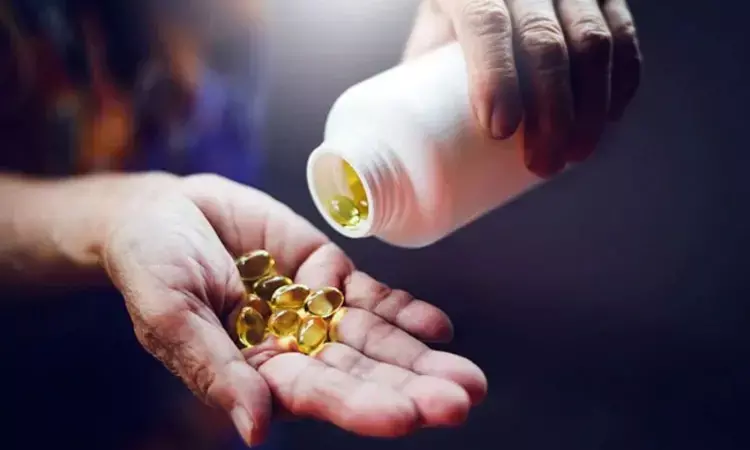- Home
- Medical news & Guidelines
- Anesthesiology
- Cardiology and CTVS
- Critical Care
- Dentistry
- Dermatology
- Diabetes and Endocrinology
- ENT
- Gastroenterology
- Medicine
- Nephrology
- Neurology
- Obstretics-Gynaecology
- Oncology
- Ophthalmology
- Orthopaedics
- Pediatrics-Neonatology
- Psychiatry
- Pulmonology
- Radiology
- Surgery
- Urology
- Laboratory Medicine
- Diet
- Nursing
- Paramedical
- Physiotherapy
- Health news
- Fact Check
- Bone Health Fact Check
- Brain Health Fact Check
- Cancer Related Fact Check
- Child Care Fact Check
- Dental and oral health fact check
- Diabetes and metabolic health fact check
- Diet and Nutrition Fact Check
- Eye and ENT Care Fact Check
- Fitness fact check
- Gut health fact check
- Heart health fact check
- Kidney health fact check
- Medical education fact check
- Men's health fact check
- Respiratory fact check
- Skin and hair care fact check
- Vaccine and Immunization fact check
- Women's health fact check
- AYUSH
- State News
- Andaman and Nicobar Islands
- Andhra Pradesh
- Arunachal Pradesh
- Assam
- Bihar
- Chandigarh
- Chattisgarh
- Dadra and Nagar Haveli
- Daman and Diu
- Delhi
- Goa
- Gujarat
- Haryana
- Himachal Pradesh
- Jammu & Kashmir
- Jharkhand
- Karnataka
- Kerala
- Ladakh
- Lakshadweep
- Madhya Pradesh
- Maharashtra
- Manipur
- Meghalaya
- Mizoram
- Nagaland
- Odisha
- Puducherry
- Punjab
- Rajasthan
- Sikkim
- Tamil Nadu
- Telangana
- Tripura
- Uttar Pradesh
- Uttrakhand
- West Bengal
- Medical Education
- Industry
Perioperative calcium and vitamin D supplementation prevents hypocalcemia after thyroidectomy: Study

Thailand: A recent study has shown that perioperative supplementation of oral vitamin D and calcium significantly decreases the risks of biochemical and symptomatic hypocalcemia compared to postoperative supplementation. The study appeared in the International Journal of Surgery in its January 2023 issue.
Hypocalcemia is the most frequent complication following total thyroidectomy. The management of postoperative hypocalcemia is challenging. Some practitioners closely monitor hypocalcemia symptoms and serum calcium levels in the postoperative period and immediately treat with oral calcium with or without an intravenous calcium infusion or a vitamin D supplement, depending on the condition's severity. In contrast, some clinicians routinely manage with perioperative, postoperative or preoperative supplementation to prevent transient hypocalcemia.
Against the above background, Pichit Sittitrai from Chiang Mai University in Chiang Mai, Thailand, and colleagues aimed to evaluate the effectiveness of perioperative combined vitamin D and calcium supplementation compared to postoperative combined vitamin D and calcium supplementation in reducing symptomatic hypocalcemia.
For this purpose, the researchers carried out a prospective randomized placebo-controlled trial in patients undergoing total or complete thyroidectomy from 2017 to 2022. Elderly patients were either assigned to receive calcium carbonate and alfacalcidol or a placebo three days before surgery. Both groups were given alfacalcidol and calcium carbonate for 14 days after surgery. Clinical outcomes (symptoms and signs of hypocalcemia, IV calcium requirement, and medication-induced hypercalcemia) and laboratory results (levels of parathyroid hormone and calcium) were compared between the groups.
The analysis included one hundred and thirty-four patients, 68 in the perioperative oral calcium and vitamin D supplementation group and 66 in the postoperative oral calcium and vitamin D supplementation group.
The study revealed the following findings:
- In the perioperative group, symptomatic hypocalcemia rates were significantly lower than in the postoperative group (8.8 and 22.7%, respectively).
- All symptomatic hypocalcemia cases occurred in the first 24 hours following surgery in the perioperative group.
- Mean calcium levels were remarkably higher in the perioperative group 48 and 24 hours after surgery.
- The IV calcium requirement rate was lower in the perioperative group, but the difference was not significant (2.9 and 12.1%).
- Mean levels of parathyroid hormone were within the normal range and did not vary between groups. In either group, no medication-induced hypercalcemia was detected.
"Our findings add to the evidence pertinent to routine supplementation in hypocalcemia prevention after total or completion thyroidectomy." the researchers wrote. "We have shown that perioperative vitamin D and calcium supplementation was more effective than postoperative supplementation alone in reducing the rates of biochemical and symptomatic hypocalcemia at 24 and 48 hours postoperatively."
"Also, the perioperative supplementation shortened the recovery period of symptomatic hypocalcemia to within 24 hours," they added. "Furthermore, perioperative supplementation could benefit patients with planned central neck dissection."
Reference:
Sittitrai, Pichit MDa; Ruenmarkkaew, Donyarat MDa,; Klibngern, Hanpon MDa; Ariyanon, Tapanut MDa; Hanprasertpong, Nutthiya MDb; Boonyaprapa, Somkamon MDa; Sreesawat, Maysayawan MDa. Perioperative versus postoperative calcium and vitamin D supplementation to prevent symptomatic hypocalcemia after total thyroidectomy: a randomized placebo controlled trial. International Journal of Surgery 109(1):p 13-20, January 2023. | DOI: 10.1097/JS9.0000000000000192
Dr Kamal Kant Kohli-MBBS, DTCD- a chest specialist with more than 30 years of practice and a flair for writing clinical articles, Dr Kamal Kant Kohli joined Medical Dialogues as a Chief Editor of Medical News. Besides writing articles, as an editor, he proofreads and verifies all the medical content published on Medical Dialogues including those coming from journals, studies,medical conferences,guidelines etc. Email: drkohli@medicaldialogues.in. Contact no. 011-43720751


